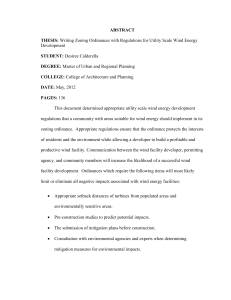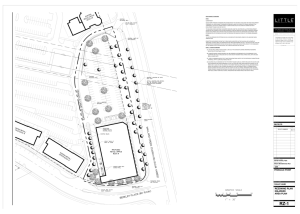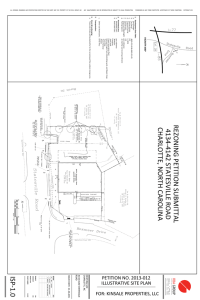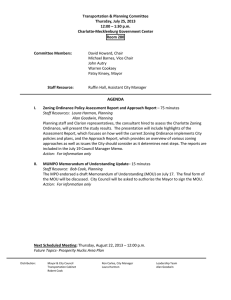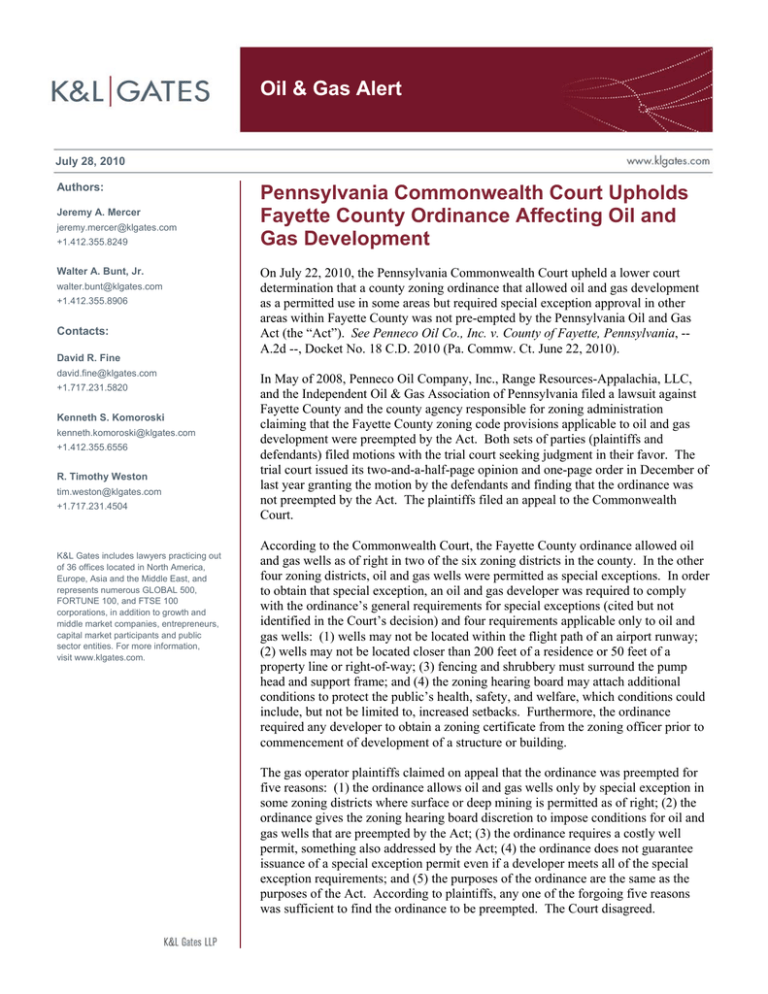
Oil & Gas Alert
July 28, 2010
Authors:
Jeremy A. Mercer
jeremy.mercer@klgates.com
+1.412.355.8249
Walter A. Bunt, Jr.
walter.bunt@klgates.com
+1.412.355.8906
Contacts:
David R. Fine
david.fine@klgates.com
+1.717.231.5820
Kenneth S. Komoroski
kenneth.komoroski@klgates.com
+1.412.355.6556
R. Timothy Weston
tim.weston@klgates.com
+1.717.231.4504
K&L Gates includes lawyers practicing out
of 36 offices located in North America,
Europe, Asia and the Middle East, and
represents numerous GLOBAL 500,
FORTUNE 100, and FTSE 100
corporations, in addition to growth and
middle market companies, entrepreneurs,
capital market participants and public
sector entities. For more information,
visit www.klgates.com.
Pennsylvania Commonwealth Court Upholds
Fayette County Ordinance Affecting Oil and
Gas Development
On July 22, 2010, the Pennsylvania Commonwealth Court upheld a lower court
determination that a county zoning ordinance that allowed oil and gas development
as a permitted use in some areas but required special exception approval in other
areas within Fayette County was not pre-empted by the Pennsylvania Oil and Gas
Act (the “Act”). See Penneco Oil Co., Inc. v. County of Fayette, Pennsylvania, -A.2d --, Docket No. 18 C.D. 2010 (Pa. Commw. Ct. June 22, 2010).
In May of 2008, Penneco Oil Company, Inc., Range Resources-Appalachia, LLC,
and the Independent Oil & Gas Association of Pennsylvania filed a lawsuit against
Fayette County and the county agency responsible for zoning administration
claiming that the Fayette County zoning code provisions applicable to oil and gas
development were preempted by the Act. Both sets of parties (plaintiffs and
defendants) filed motions with the trial court seeking judgment in their favor. The
trial court issued its two-and-a-half-page opinion and one-page order in December of
last year granting the motion by the defendants and finding that the ordinance was
not preempted by the Act. The plaintiffs filed an appeal to the Commonwealth
Court.
According to the Commonwealth Court, the Fayette County ordinance allowed oil
and gas wells as of right in two of the six zoning districts in the county. In the other
four zoning districts, oil and gas wells were permitted as special exceptions. In order
to obtain that special exception, an oil and gas developer was required to comply
with the ordinance’s general requirements for special exceptions (cited but not
identified in the Court’s decision) and four requirements applicable only to oil and
gas wells: (1) wells may not be located within the flight path of an airport runway;
(2) wells may not be located closer than 200 feet of a residence or 50 feet of a
property line or right-of-way; (3) fencing and shrubbery must surround the pump
head and support frame; and (4) the zoning hearing board may attach additional
conditions to protect the public’s health, safety, and welfare, which conditions could
include, but not be limited to, increased setbacks. Furthermore, the ordinance
required any developer to obtain a zoning certificate from the zoning officer prior to
commencement of development of a structure or building.
The gas operator plaintiffs claimed on appeal that the ordinance was preempted for
five reasons: (1) the ordinance allows oil and gas wells only by special exception in
some zoning districts where surface or deep mining is permitted as of right; (2) the
ordinance gives the zoning hearing board discretion to impose conditions for oil and
gas wells that are preempted by the Act; (3) the ordinance requires a costly well
permit, something also addressed by the Act; (4) the ordinance does not guarantee
issuance of a special exception permit even if a developer meets all of the special
exception requirements; and (5) the purposes of the ordinance are the same as the
purposes of the Act. According to plaintiffs, any one of the forgoing five reasons
was sufficient to find the ordinance to be preempted. The Court disagreed.
Oil & Gas Alert
Addressing the first and second arguments together,
the Court rejected the plaintiffs’ arguments, finding
that the county’s decision to make oil and gas wells
a special exception use in some districts was
appropriate because, in the court’s view, the specific
special exception requirements were not directed at
technical aspects of well functioning or matters
ancillary thereto. Citing to the Pennsylvania
Supreme Court’s Oakmont Borough decision
(Huntley & Huntley, Inc. v. Borough Council of the
Borough of Oakmont, 964 A.2d 855 (Pa. 2009)), the
Commonwealth Court then held that the restrictions
merely apply to a well’s location within the county
and “preserve[e] the character of residential
neighborhoods, and encourage[e] beneficial and
compatible land uses.” County of Fayette, at p. 15.
The Court similarly turned aside the fourth argument
advanced by plaintiffs. According to the Court, the
fact that the zoning hearing board may impose
additional conditions on an oil and gas developer is
not equivalent to the ordinance in the Salem
Township case (Range Resources-Appalachia, LLC
v. Salem Twp., 964 A.2d 869 (Pa. 2009)) because the
Fayette County ordinance does not set up the
specified requirements as the “minimum terms
acceptable” or expressly state that the zoning
hearing board “may” issue the permit once the
requirements are met, leaving discretion not to issue
that permit. The Court then went further and found
that this ordinance does not “provide Fayette County
or its zoning hearing board with virtually unbridled
discretion to deny permission to drill an oil and gas
well after compliance with the applicable zoning
regulations.” County of Fayette, at p. 15.
Likewise, the Court rejected plaintiffs’ argument
that the costly requirement to obtain a zoning
certificate was a duplication of, or preempted by, the
Act’s permitting process. After noting that there
was nothing in the record regarding the cost for the
certificate, the Court rejected this argument on the
basis that the certificate is a general requirement
applicable to all development in the county. “The
effect of [the certification process] is … clearly to
control the orderly development and use of land in a
manner consistent with the Zoning Ordinance’s
requirements.” Id., at p. 17.
Finally, the Court rejected the plaintiffs’ preemption
claim that the purposes of the ordinance duplicated
those of the Act. Even though plaintiffs pointed to
several provisions of the ordinance that were
identical or nearly identical to the purposes of the
Act, the Court determined the “overlap” in purpose
not to be fatal to the application of the ordinance to
oil and gas development. Distilling the “salient
objectives” from the text of the ordinance, the Court
found that the zoning ordinance’s “restrictions” on
oil and gas development are “preserving the
character of residential neighborhoods, as well as
each zoning district, and encouraging beneficial and
compatible land uses.” Id., at p. 18. Based on that
distillation, the Court then concluded that the
restrictions “do not accomplish the same purposes
as set forth in” the Act. Id., at p. 19. In concluding
its decision, the Court stated that the Fayette County
ordinance is one of general applicability and not a
comprehensive regulatory scheme directed solely to
the oil and gas industry.
As both sides still have time to seek rehearing in the
Commonwealth Court or file a petition for review
with the Supreme Court, it is too early to say
whether this decision will stand or what
implications it will have, if any, for oil and gas
development within the Commonwealth.
Anchorage Austin Beijing Berlin Boston Charlotte Chicago Dallas Dubai Fort Worth Frankfurt Harrisburg Hong Kong London
Los Angeles Miami Moscow Newark New York Orange County Palo Alto Paris Pittsburgh Portland Raleigh Research Triangle Park
San Diego San Francisco Seattle Shanghai Singapore Spokane/Coeur d’Alene Taipei Tokyo Warsaw
Washington, D.C.
K&L Gates includes lawyers practicing out of 36 offices located in North America, Europe, Asia and the Middle East, and represents numerous
GLOBAL 500, FORTUNE 100, and FTSE 100 corporations, in addition to growth and middle market companies, entrepreneurs, capital market
participants and public sector entities. For more information, visit www.klgates.com.
K&L Gates comprises multiple affiliated entities: a limited liability partnership with the full name K&L Gates LLP qualified in Delaware and
maintaining offices throughout the United States, in Berlin and Frankfurt, Germany, in Beijing (K&L Gates LLP Beijing Representative Office), in
Dubai, U.A.E., in Shanghai (K&L Gates LLP Shanghai Representative Office), in Tokyo, and in Singapore; a limited liability partnership (also named
K&L Gates LLP) incorporated in England and maintaining offices in London and Paris; a Taiwan general partnership (K&L Gates) maintaining an
office in Taipei; a Hong Kong general partnership (K&L Gates, Solicitors) maintaining an office in Hong Kong; a Polish limited partnership (K&L
Gates Jamka sp.k.) maintaining an office in Warsaw; and a Delaware limited liability company (K&L Gates Holdings, LLC) maintaining an office in
July 28, 2010
2
Oil & Gas Alert
Moscow. K&L Gates maintains appropriate registrations in the jurisdictions in which its offices are located. A list of the partners or members in each
entity is available for inspection at any K&L Gates office.
This publication is for informational purposes and does not contain or convey legal advice. The information herein should not be used or relied upon
in regard to any particular facts or circumstances without first consulting a lawyer.
©2010 K&L Gates LLP. All Rights Reserved.
July 28, 2010
3

